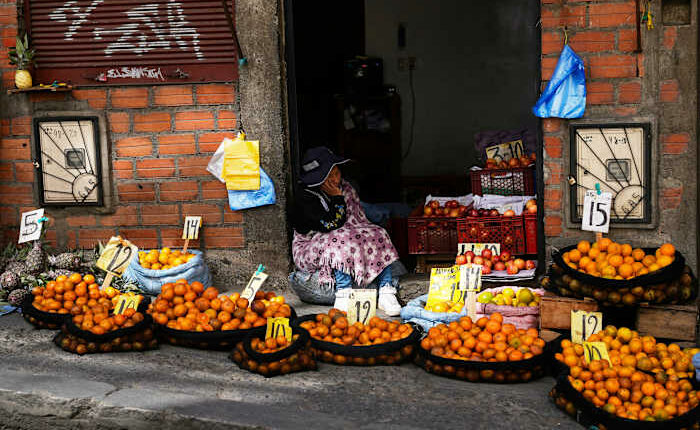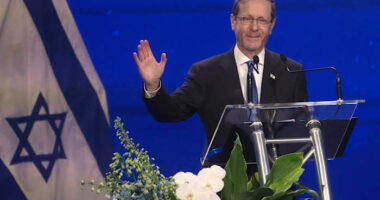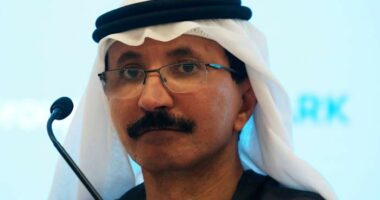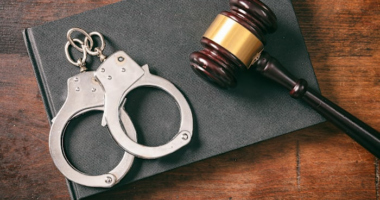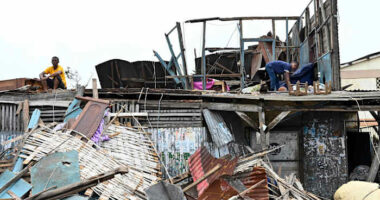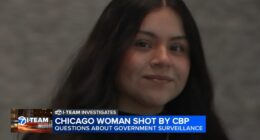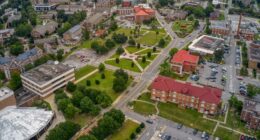Share this @internewscast.com

LA PAZ – On Sunday, Bolivians voted in presidential and congressional elections, potentially marking a significant shift from the long-ruling leftist party to a possible right-wing victory for the first time in over twenty years.
The election on Sunday is one of the most consequential for Bolivia in recent times — and one of the most unpredictable.
Even with the election imminent, about 30% of voters are still undecided. Surveys indicate that the two prominent right-wing contenders, wealthy businessman Samuel Doria Medina and former President Jorge Fernando “Tuto” Quiroga, are in a close race.
Many undecided voters
However, a right-wing triumph is not a foregone conclusion. Many loyal supporters of the ruling Movement Toward Socialism, or MAS, party, despite its internal conflicts, reside in rural areas and are often underrepresented in polls.
Facing the worst economic crisis in forty years, with long waits in fuel lines, difficulty obtaining subsidized bread, and double-digit inflation, opposition candidates are framing this election as an opportunity to change the nation’s path.
“I have rarely, if ever, seen a situational tinderbox with as many sparks ready to ignite,” writes Daniel Lansberg-Rodriguez, founding partner of the New York-based advisory firm Aurora Macro Strategies, in a memo. He explains that breaking the MAS party’s political dominance could propel “the country into uncharted political waters amid rising polarization, severe economic fragility, and a widening rural–urban divide.”
Bolivia could follow rightward trend
The election’s results will decide whether Bolivia — a nation of approximately 12 million with vast lithium reserves and crucial rare earth minerals — aligns with the emerging trend in Latin America, where right-wing figures like Argentina’s libertarian Javier Milei, Ecuador’s strongman Daniel Noboa, and El Salvador’s conservative populist Nayib Bukele are gaining traction.
A right-wing government in Bolivia could trigger a major geopolitical realignment for a country now allied with Venezuela’s socialist-inspired government and world powers such as China, Russia and Iran.
Conservative candidates vow to restore US relations
Doria Medina and Quiroga have praised the Trump administration and vowed to restore ties with the United States — ruptured in 2008 when charismatic, long-serving former President Evo Morales expelled the American ambassador.
The right-wing front-runners also have expressed interest in doing business with Israel, which has no diplomatic relations with Bolivia, and called for foreign private companies to invest in the country and develop its rich natural resources.
After storming to office in 2006 at the start of the commodities boom, Morales, Bolivia’s first Indigenous president, nationalized the nation’s oil and gas industry, using the lush profits to reduce poverty, expand infrastructure and improve the lives of the rural poor.
After three consecutive presidential terms, as well as a contentious bid for an unprecedented fourth in 2019 that set off popular unrest and led to his ouster, Morales has been barred from this race by Bolivia’s constitutional court.
His ally-turned-rival, President Luis Arce, withdrew his candidacy for the MAS on account of his plummeting popularity and nominated his senior minister, Eduardo del Castillo.
As the party splintered, Andrónico Rodríguez, the 36-year-old president of the senate who hails from the same union of coca farmers as Morales, launched his bid.
Ex-president Morales urges supports to deface ballots
Rather than back the candidate widely considered his heir, Morales, holed up in his tropical stronghold and evading an arrest warrant on charges related to his relationship with a 15-year-old girl, has urged his supporters to deface their ballots or leave them blank.
Voting is mandatory in Bolivia, where some 7.9 million Bolivians are eligible to vote.
Doria Medina and Quiroga, familiar faces in Bolivian politics who both served in past neoliberal governments and have run for president three times before, have struggled to stir up interest as voter angst runs high.
“There’s enthusiasm for change but no enthusiasm for the candidates,” said Eddy Abasto, 44, a Tupperware vendor in Bolivia’s capital of La Paz torn between voting for Doria Medina and Quiroga. “It’s always the same, those in power live happily spending the country’s money, and we suffer.”
Conservative candidates say austerity needed
Doria Medina and Quiroga have warned of the need for a painful fiscal adjustment, including the elimination of Bolivia’s generous food and fuel subsidies, to save the nation from insolvency. Some analysts caution this risks sparking social unrest.
“A victory for either right-wing candidate could have grave repercussions for Bolivia’s Indigenous and impoverished communities,” said Kathryn Ledebur, director of the Andean Information Network, a Bolivian research group. “Both candidates could bolster security forces and right-wing para-state groups, paving the way for violent crackdowns on protests expected to erupt over the foreign exploitation of lithium and drastic austerity measures.”
All 130 seats in Bolivia’s Chamber of Deputies, the lower house of Parliament, are up for grabs, along with 36 in the Senate, the upper house.
If, as is widely expected, no one receives more than 50% of the vote, or 40% of the vote with a lead of 10 percentage points, the top two candidates will compete in a runoff on Oct. 19 for the first time since Bolivia’s 1982 return to democracy.
Copyright 2025 The Associated Press. All rights reserved. This material may not be published, broadcast, rewritten or redistributed without permission.
